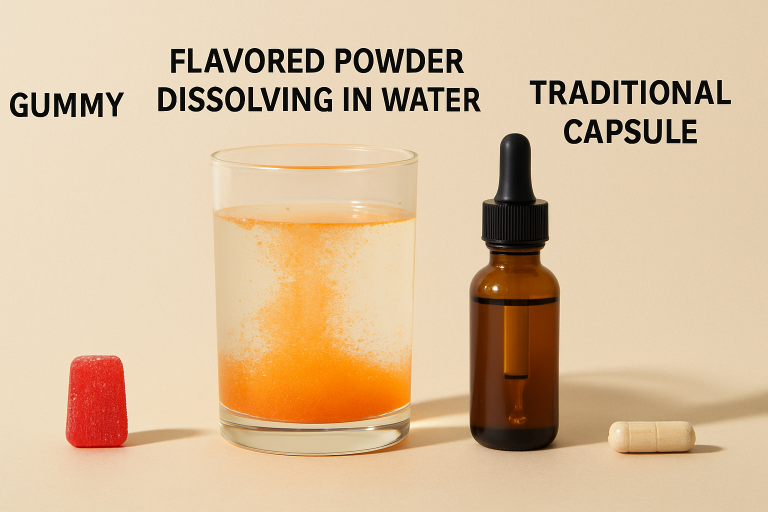Table of Contents
- 1 Personalized Nutrition: Tailoring Supplements to Individual Needs
- 2 Embracing Plant-Based and Sustainable Ingredients
- 3 Innovative Delivery Methods Enhance Consumer Experience
- 4 Technological Advancements Revolutionize Supplement Production
- 5 Increased Regulatory Oversight Ensures Product Safety
- 6 Conclusion
Personalized Nutrition: Tailoring Supplements to Individual Needs
Supplement manufacturers are ushering in an era of wellness that is more personalized than ever before. Rather than relying on “one-size-fits-all” vitamins and minerals, companies are leveraging an array of scientific tools, such as genetic testing, advanced blood analysis, and data from wearable health trackers, to build targeted nutritional profiles. This innovation translates into custom supplements designed to address each customer’s distinct genetics, lifestyle, diet, and goals. Whether an individual wants to enhance energy, support their immune system, improve sleep, or maximize athletic performance, today’s technology makes it possible to create scientifically based formulas tailored to deliver those results.
Brands such as in https://www.makersnutrition.com/, are leading by example, adapting their processes to produce these bespoke, data-driven products at scale. Their approach includes in-depth consultations, personalized questionnaires, and even DNA or blood testing kits, giving consumers a much more interactive and hands-on experience. By involving customers directly in their health decisions, supplement brands can foster greater engagement, increase satisfaction, and cultivate brand loyalty in a marketplace that grows more competitive every day. As consumers become more educated and discerning about what they put into their bodies, the demand for such highly tailored supplementation is only set to grow stronger, making personalized nutrition a central pillar of the industry’s future.
Embracing Plant-Based and Sustainable Ingredients
Sustainability has become a priority in the supplement manufacturing industry, with eco-conscious shoppers demanding clear evidence of responsible sourcing and minimal harm to the planet. Companies are focusing on plant-based ingredients and renewable raw materials, such as organically grown herbs, vegan proteins, and marine botanicals, to reduce reliance on animal-derived components and non-renewable resources. Packaging is also undergoing a revolution, with manufacturers investing in compostable, recyclable, or biodegradable options to reduce their environmental footprint. Transparency is growing as consumers demand detailed information about ingredient origins and supply chain practices. Regulatory bodies and third-party certifications are highlighting brands that go beyond ethical sourcing and production standards, fostering accountability and confidence in supplement safety. This green transformation is particularly resonating among millennials and Gen Z, who see their purchasing decisions as a reflection of personal values and social responsibility.
Innovative Delivery Methods Enhance Consumer Experience
The supplement market of today looks quite different from the past, thanks to a wave of new, innovative delivery systems that go well beyond traditional capsules and tablets. Gummies, effervescent powders, chewables, and liquid drops have taken center stage, making supplements not only easier to consume but also more appealing, especially to children and adults with pill fatigue. Flavored powders that dissolve rapidly into water or smoothies give busy consumers a convenient way to boost their nutrition on the go, fitting seamlessly into modern, fast-paced lifestyles.
This move toward enjoyable, easy-to-use formats is more than just a nod to convenience. Research highlighted by Healthline shows that improved palatability directly increases adherence, a crucial factor in achieving the intended health benefits of supplementation. For people who struggle with traditional pill swallowing due to medical conditions, age, or preference, these new forms are helping remove barriers, making wellness more accessible and less intimidating. By listening attentively to consumer needs and preferences, manufacturers are building stronger relationships and ensuring that supplements support daily health routines with ease and consistency.

Technological Advancements Revolutionize Supplement Production
Technology is transforming the manufacturing side of supplements in ways that would have seemed impossible just a decade ago. Artificial intelligence and machine learning algorithms can analyze millions of data points from clinical research, consumer feedback, and real-world results to formulate combinations that are both safe and maximally effective. AI-driven product development can fine-tune recommended dosages by demographic variables like gender, age, lifestyle, and even geography, initiating a smarter, data-centric approach to nutrition.
Even more revolutionary is the application of 3D printing to supplement creation, which allows for the precise layering of ingredients to match a specific individual’s needs within a single pill, chewable, or gummy. For example, a supplement can be customized for an athlete requiring elevated levels of certain vitamins and minerals or for an older adult with distinct nutritional needs. Such technology also streamlines manufacturing efficiency and supports the development of limited-run or specialty products for niche health concerns.
Increased Regulatory Oversight Ensures Product Safety
Greater innovation in the supplement industry means safeguarding consumer health is paramount. Regulators are stepping up their oversight, insisting on higher transparency, accuracy, and quality at every stage of production. New laws and guidelines require companies to provide clear, accurate ingredient labels, undergo periodic facility inspections, and submit products for rigorous independent testing to verify that supplements deliver exactly what their labels promise and nothing harmful or extraneous.
Consumers, for their part, are increasingly demanding traceability, insisting on knowing where ingredients are sourced, how they’re handled, and whether products are tested for contaminants. Third-party certifications, non-GMO labels, and quality seals are helping set the best manufacturers apart from the rest, providing shoppers with extra assurance and making it easier to make informed, safe choices. By exceeding baseline regulatory and certification requirements, industry innovators are raising the bar for safety and transparency, cultivating trust and loyalty in a sector that has historically faced scrutiny and skepticism.
Conclusion
The dietary supplement industry is undergoing a dynamic transformation as manufacturers respond to consumer demand for more personalized, sustainable, and user-friendly wellness solutions. Data-driven customization, green practices, inventive delivery formats, and leading-edge technology are collectively raising the standard of products on the market. As regulations tighten and transparency becomes the hallmark of trustworthy brands, the companies that invest in continuous improvement and authentic consumer engagement will play the most significant role in shaping the future of health and nutrition. As wellness becomes an increasingly central part of everyday life, those who stay at the forefront of these shifts will help define the next generation of health and nutrition products.

